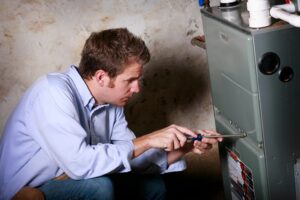A burning smell coming from the furnace in your Bath, Pennsylvania, home isn’t always a cause for concern. Finding the source of the smell, however, is extremely important. Once you know what’s causing it, you can pinpoint whether you need to take further action. Burning plastic and an overheated blower motor are two sources that definitely require your attention. Here’s a look at six reasons your furnace could smell like it’s burning and what you need to do about it.
Burning Dust
There’s a good chance you’ve noticed a burning smell come from the furnace when you turn it on for the first time as the cold weather sets in. Furnaces commonly accumulate an amount of dust when they aren’t being used for months on end. This dust settles on everything from the heat exchanger to the burners.
When you turn it on for the first time each year, this dust burns off and produces a burning smell. The vents connected to your home’s heating system will usually emit this smell throughout the entire home, but there’s no need for alarm. After a few minutes, the smell will dissipate. If it doesn’t, you should contact an HVAC specialist to determine the problem.
Clogged Air Filter
Sometimes, simply changing the air filter on a furnace can keep it from putting off a burning smell. The blower motor has to work much harder when the filter is clogged, which causes it to overheat. In an attempt to keep pushing air through the clogged filter, a burning smell starts to develop because of the overheating. Plus, a clogged filter causes high levels of dirt to accumulate on the furnace, which will burn off and produce a burning odor when the furnace heats up.
Electrical Burning
Normally, a furnace will power itself down when it starts to overheat. If it doesn’t, this means the safety feature on the unit is broken, and you need to have it fixed promptly. Without this safety feature functioning, the risk of an electrical fire increases and presents a major safety hazard for you and your family. Have an HVAC specialist check for burning electrical components if you notice a burning electrical smell coming from your vents.
Burning Plastic
The smell of plastic burning could mean a foreign object has made its way into your heating unit. This could be anything from a plastic bottle cap to one of your children’s plastic toys. As the plastic burns from the heat of the furnace, it can emit fumes into the home that are harmful to your health. Any time you notice your furnace giving off the smell of burning plastic, turn off your system and contact an HVAC professional quickly.
Smell of Gunpowder
Once the circuit board overheats in a furnace, it will give off a smell that’s something similar to the smell of gunpowder. The same applies to an overheated fan motor. Shut off the furnace immediately if you smell gunpowder, and have a professional HVAC contractor visit your home to make necessary repairs. Don’t turn the furnace back on until the HVAC professional gives you the okay.
Smell of Oil or Smoke
Oil furnaces often emit smells similar to the smell of smoke or oil. In these types of furnaces, you’ll want to change the oil filter to ensure overheating does not occur. If the smell continues, contact an HVAC professional to diagnose and repair the problem.
While waiting on the HVAC technician to arrive, turn the unit off and don’t turn it back on until necessary repairs have been made. The unit could catch on fire if you continue running it.
A smell of burning dust when you first turn on the furnace each year probably isn’t a reason to be concerned. If it lasts for more than a few minutes though, or if you smell gunpowder, oil, or notice a smoky smell, it’s best to turn your system off and have it inspected as soon as possible. Sullivan Oil & Propane specializes in a variety of furnace installation and repair services. Contact us today by visiting our website, or give us a call at (610) 810-3992.
Image provided by Shutterstock



